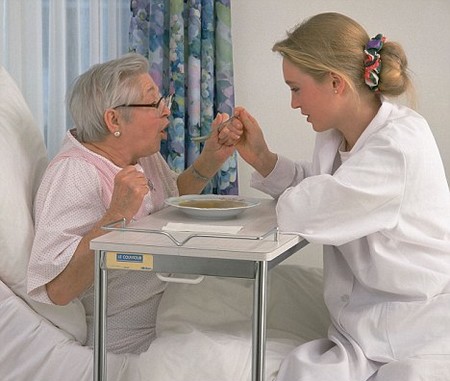For a number of conditions the doctor will order a specific diet, which must, of course, be followed carefully. In many other cases, the doctor will simply indicate the type of diet to give the patient. You then have freedom of choice within the prescribed limits, according to the patient’s tastes.
Fluid diets
The patient is only given fluids. An adult should have at least 3 litres (about 5 pints) a day and at least half of this should be milk. Whole, or unskimmed, milk is a unique fluid because it contains every food requirement, with the exception of vitamin C and iron. Some patients will drink milk as it is, others prefer a flavouring, such as cocoa, coffee, chocolate, malted milks or Bovril. If the patient is very thin or undernourished or if he is likely to be taking fluids only for some time, one of the protein preparations such as Complan can be added to the milk.
To complement the milk the patient may have water, fruit juice, thin soup or any other suitable drink, such as Bovril. It may be helpful to remember that since an average cup holds about 150ml of fluid, 20 cups will be needed to give the required daily intake of 3 litres (3000ml).
The doctor will advise on the amount of fluid a child should drink each day. Children may need to be encouraged and tempted to drink as much as they need to. Try diluting fruit juice, to help them drink more of it. Give them milk flavoured with milkshake mixes according to their preference, and serve their drinks in different glasses and cups, with brightly coloured straws.
Light diets
A light diet consists of easily digestible foods such as fish, white meat, eggs, milk, bread and butter. Vegetable and fruit or fruit juice are given in small quantities but fried foods should be avoided. A light diet can seem boring but a little ingenuity works wonders and attractive presentation of the food may solve the problem.
Special diets
Many special diets play an important part in the treatment of some diseases, such as diabetes. In this disease, the body is unable to store any reserves of glucose. Carbohydrates are therefore given in limited quantities, just adequate for the body’s immediate needs. If the diet is not followed, the patient may become unwell and if he is then not treated he may lose consciousness and die. If you are caring for a diabetic patient, you will usually be supplied with a diet sheet but, if there is any difficulty, you should seek the advice of the doctor, community nursing sister or health visitor.
Another common special diet is the low-calorie diet, prescribed for the patient who is overweight. There is evidence that excessive or unhealthy eating habits are learned in infancy: over the years there can be a steady increase in weight. Metabolic factors may be another cause. Overweight people are much more likely to develop illnesses of various kinds, such as joint and back pain, coronary artery disease and high blood pressure. Prevention is always better than cure, and anyone who has a tendency to be overweight would be wise to restrict his total carbohydrate intake during illness or convalescence and be careful not to eat between meals: prolonged inactivity may exacerbate a tendency to gain weight. Once a diet is prescribed for someone who is seriously overweight, however, carbohydrate foods are drastically reduced. A diet sheet is prepared for the patient providing approximately 1000 calories (4000 joules) a day. Bread, potatoes and sugar are severely restricted and replaced by salads and fresh fruit. The main purpose is to re-educate the eating habits, as most people positively enjoy the carbohydrate element in their food and do not like to be restricted to items which they probably regard as unsatisfying and inadequately “filling”.
